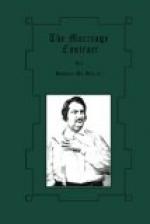Paul was a count; nobility was once more of matrimonial value; he could, and he ought to make a good marriage. While many women desire a title, many others like to marry a man to whom a knowledge of life is familiar. Now Paul had acquired, in exchange for the sum of seven hundred thousand francs squandered in six years, that possession, which cannot be bought and is practically of more value than gold and silver; a knowledge which exacts long study, probation, examinations, friends, enemies, acquaintances, certain manners, elegance of form and demeanor, a graceful and euphonious name,—a knowledge, moreover, which means many love-affairs, duels, bets lost on a race-course, disillusions, deceptions, annoyances, toils, and a vast variety of undigested pleasures. In short, he had become what is called elegant. But in spite of his mad extravagance he had never made himself a mere fashionable man. In the burlesque army of men of the world, the man of fashion holds the place of a marshal of France, the man of elegance is the equivalent of a lieutenant-general. Paul enjoyed his lesser reputation, of elegance, and knew well how to sustain it. His servants were well-dressed, his equipages were cited, his suppers had a certain vogue; in short, his bachelor establishment was counted among the seven or eight whose splendor equalled that of the finest houses in Paris.
But—he had not caused the wretchedness of any woman; he gambled without losing; his luck was not notorious; he was far too upright to deceive or mislead any one, no matter who, even a wanton; never did he leave his billets-doux lying about, and he possessed no coffer or desk for love-letters which his friends were at liberty to read while he tied his cravat or trimmed his beard. Moreover, not willing to dip into his Guienne property, he had not that bold extravagance which leads to great strokes and calls attention at any cost to the proceedings of a young man. Neither did he borrow money, but he had the folly to lend to friends, who then deserted him and spoke of him no more either for good or evil. He seemed to have regulated his dissipations methodically. The secret of his character lay in his father’s tyranny, which had made him, as it were, a social mongrel.
So, one morning, he said to a friend named de Marsay, who afterwards became celebrated:—
“My dear fellow, life has a meaning.”
“You must be twenty-seven years of age before you can find it out,” replied de Marsay, laughing.
“Well, I am twenty-seven; and precisely because I am twenty-seven I mean to live the life of a country gentleman at Lanstrac. I’ll transport my belongings to Bordeaux into my father’s old mansion, and I’ll spend three months of the year in Paris in this house, which I shall keep.”
“Will you marry?”
“I will marry.”




